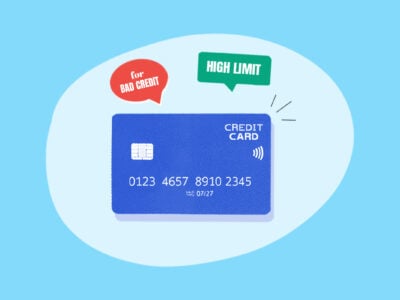Credit repair organizations (CROs) can be legitimate and law-abiding companies, but they can also be a front for something much more sinister. It’s not uncommon for fraudsters to take advantage of people in desperate financial situations, ultimately leaving them worse off than when they started.
Knowing how to spot illegal credit repair activities and shady business practices will help you protect your credit, finances, and identity and find reputable organizations that can give you the help you really need.
Table of Contents
What are the warning signs of a credit repair scam?
Thankfully, it’s usually pretty easy to spot credit repair scams once you know what to look for. This is because there are strict laws in place to protect consumers from predatory credit repair business practices, and companies that break these laws are usually the ones that are trying to scam you.
Avoid giving money or personal information to companies that do any of the following things.
1. Make promises that seem too good to be true
Credit repair companies can’t just wave a magic wand and make bad credit disappear. A sure sign of a scam is if the company promises to achieve certain results that they can’t actually guarantee.
Never work with a credit repair company that promises to do any of the following things:
- Increase your credit score by a specific number of points
- Erase accurate derogatory marks from your credit report
- Wipe your credit history clean
- Get you access to a certain loan or line of credit
While a legit credit repair expert may be able to do some of these things, there are no guarantees in credit repair. The only surefire cure for bad credit is time.
2. Charge you upfront for services
It’s against the law for credit repair companies to charge you upfront for services they haven’t fully performed yet. 1
The cost of credit repair varies from company to company, and pricing models may differ. Some credit repair companies take a pay-per-deletion approach where they charge you for individual items they’ve removed from your credit report. Others offer subscription-based services.
Regardless of how the company wants to charge you, they should never ask you to pay before they’ve given you some type of credit repair service. If they do, it’s a sign of a credit repair scam.
3. Don’t explain your rights
You have rights under the Credit Repair Organization Act (CROA), which is a federal law dictating what credit repair organizations can and can’t do. One of the stipulations is that they must give you a written statement summarizing these rights (titled “Consumer Credit File Rights Under State and Federal Law”).
This document should explain that you have the right to take the following actions:
- Contact the credit bureaus yourself to dispute inaccurate information in your credit file
- File a credit dispute by yourself free of charge
- Add a personal statement to your credit report if you’re unhappy with the dispute results
- Obtain copies of your credit report from each credit bureau
- Sue a credit repair organization that violates the Credit Repair Organization Act
- Cancel your credit repair contract for any reason within 3 days of signing up
You have a legal right to repair your credit all by yourself for free. Any credit repair company that tells you otherwise or seems evasive when you ask is likely trying to scam you.
Their rationale is simple—if you knew you could dispute your credit reports for free on your own, you might not want to pay them to do it for you. Needless to say, you don’t want to work with a company that will mislead you like that.
4. Tell you not to contact the credit reporting agencies
Credit repair companies might tell you not to contact the credit bureaus for the same reason that they might fail to disclose your rights to you—to keep you in the dark about what you can do to repair your credit on your own and what credit repair companies actually can do for you.
Remember that you have the right to review your credit reports and communicate with credit reporting agencies directly to ensure that your credit file remains accurate and up to date.
The entire credit repair process should be transparent. If you ever get the sense your credit repair company is hiding things from you, stop working with them and find a different company.
5. Claim they can give you a new credit report or identity
There’s no legal way to get a brand new credit report or completely clear your credit history overnight. Any company that claims to be able to immediately erase all your bad credit and get you access to new loans and credit cards may be using unlawful or shady credit repair practices.
Here are a couple illegal credit repair strategies to watch out for:
- Creating a new identity: Some companies sell identification numbers, claiming that you can use them to access new lines of credit. Make no mistake—using a credit privacy number (CPN), credit profile number, or employer identification number (EIN) to trick lenders is illegal.
- Credit washing: This usually involves filing an identity theft report when your identity wasn’t really stolen with the aim of getting derogatory marks removed from your credit report. This is considered fraud and is also highly illegal.
Generally speaking, credit repair is legal. However, there are fraudulent companies out there that don’t always play by the rules, and knowing how to spot them will keep you from getting into legal trouble.
How to report credit repair scams
If you think you’ve been scammed or you come across a credit repair company that shows any of the warning signs mentioned above, immediately report them to the authorities. You can do so by filing a fraud report with the Federal Trade Commission, submitting a complaint with the Consumer Financial Protection Bureau, or reporting the company to your state attorney general.
How to find a legit credit repair company
Not all credit repair companies are scammers. Some of these organizations can legitimately help you fix problems with your credit history and improve your credit score. To avoid falling victim to credit repair scams, do your research first and choose a reputable company.
Depending on your situation, you may want to consider getting help from a credit counseling agency or debt counselor instead.
These are good places to begin your search:
- Credit repair companies that have been accredited by the Better Business Bureau (BBB)
- This list of government-approved credit counseling agencies
Can you repair your credit for free?
Yes—don’t let anyone tell you that you need to pay to get your credit fixed. With the wealth of information and resources available online, you can repair your credit all by yourself, 100% free of charge.
The guides below can help you get started on your credit repair journey:
- How to remove negative information from your credit report by yourself
- How to dispute an item on your credit report
- How to negotiate with debt collectors
- How to fix your credit
- How to rebuild your credit
Don’t get discouraged if you don’t see results right away. It may take a long time to repair your credit, depending on the type of damage you’re dealing with. However, understanding how credit works and where to focus your efforts is the first step to achieving good credit in the long run.
Takeaway: Credit repair scams can put your finances, credit, and identity at risk if you don’t know how to spot them early on.
- Not all credit repair companies are scammers, but some companies take advantage of people in desperate situations by masquerading as reputable credit repair organizations.
- Credit repair companies can’t do anything you can’t do by yourself. You have the right to review your credit reports, file credit disputes, and negotiate with creditors for free.
- Credit repair scammers may make impossible promises, charge you upfront, conceal your rights, tell you not to talk to the credit bureaus, or try to sell you a new identity.
- Before signing a contract with a credit repair company or giving them any money or personal information, make sure to do your research first.
- Instead of hiring a credit repair company, you can also consult a credit repair counselor or take steps to fix your credit on your own.







